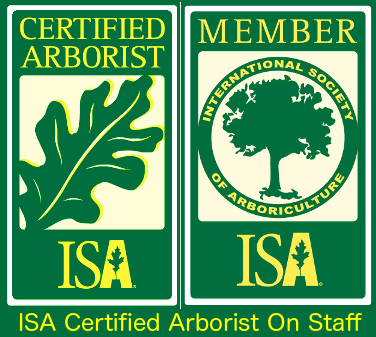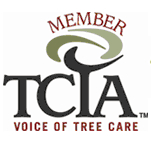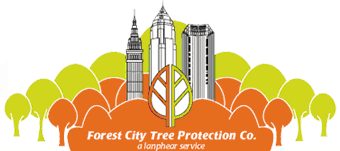A Northeast Ohio Gem – Check Out the Fall Colors at the Hachs-Otis Nature Preserve
October 5, 2018 • #Arboriculture #Fall Color #Fall Leaf Peeping #Uncategorized #Urban Forestry

Almost every autumn, I make the short trek out to Willoughby Hills to visit the little-known Hachs-Otis Nature Preserve and take the short loop trail out to a spectacular view of the Chagrin River valley. In the fall, when northeast Ohio’s trees are in their full glory, the steep shale cliffs and brilliant forests provide contrast to the rushing river and cracking canyon walls of Hach Otis State Preserve.
Along the short boardwalk and trail that leads out to the overlook, you’ll pass some spectacular trees. Then, before you know it, you find yourself at the clifftop opening where your eyes are treated to a wide panoramic view of the trees & river before you. Don’t forget to bring your binoculars and to take plenty of photos!
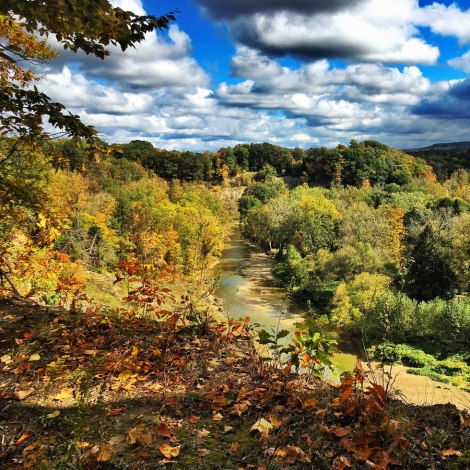
How to Get There: Hachs-Otis Nature Preserve is located at the end of Skyline Drive, a short dead-end street off of River Rd (Rt 174), just north of Chardon Rd (Rt 6). If one takes I-90 to the Rt 91 (SOM Center Rd) exit (1st exit on I-90 East after the I-271 merge). Take Rt 91 south to Rt 6, turn left and drive east to River Rd (Rt 174). Skyline Drive will be the very first street on your left. Drive down to its ending at the Hachs-Otis Nature Preserver parking area.
Click Here for a Brief PBS Hachs-Otis Video
The preserve is managed by the Ohio Department of Natural Resources (ODNR), Division of Natural Areas and Preserves. Click Here to Check Out the Hachs-Otis webpage.
Your Trees Are Thirsty, Too!
August 8, 2016 • #TreeCare

NEW PLANTINGS
Immediately after planting, all tree roots are in the original root ball or container area. Until new roots grow out & into the surrounding soil, water the original root ball area and just beyond. This area may dry out faster than the surrounding soil, so check the moisture in this area frequently for the first 1-2 months after planting. Overhead spray irrigation systems and natural rain falls are usually insufficient to thoroughly wet them. Water must be directed on the transplanted root ball and applied slowly for absorption.
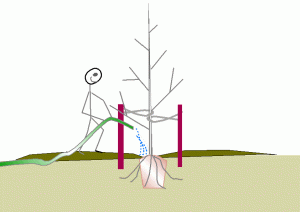
New trees need approximately 15 to 20 gallons of water at the time of planting, depending on how dry the soil is. Water twice a week for the first 2 weeks and once a week thereafter. Stop if 2 inches or more of rain falls within a day or two. Resume watering one week after rain stops. Continue to water in early spring, late fall or even winter when temperatures are over 50 degrees and breezy. If in doubt feel the root ball.
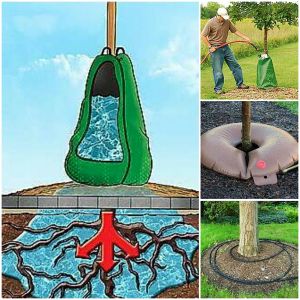
Watering is best accomplished by hand with a hose, bucket or setting up an irrigation system with specific emitters applying water directly around the stem for each individual plant. There are a variety of watering “bags” available that usually hold 20 gallons of water, and work great during hot summer months.
When using a hose, turn down the water pressure or force to 25% or fill a 5 gallon bucket with water after it is drilled with four 1/4 inch holes, one inch apart on one side and place next to the stem.
For shade, flowering and evergreen trees 8 to 15 feet in height, apply 10 gallons slowly. Using a 5/8″ hose with an average of 40 pounds of water pressure it takes about 4 minutes to generate 10 gallons. At 25% force or 10 pounds pressure it will take 12 minutes for each plant.
For shrubs and evergreens 2 to 6 feet in height apply 5 gallons slowly. At 25% force or 10 pounds pressure it will take 6 minutes for each plant.
For a few annuals, perennials and ground covers apply 1 gallon slowly. At 25% force or 10 pounds pressure it will take 1 minute per plant. Since plants are small, water will saturate surrounding soil and keep plants from drying out quickly. For many plants, use an overhead sprinkler or automatic irrigation system. Apply 1 inch of water uniformly over the entire planting bed. At 40 pounds pressure it will take 30 minutes for each area.
ESTABLISHED TREES
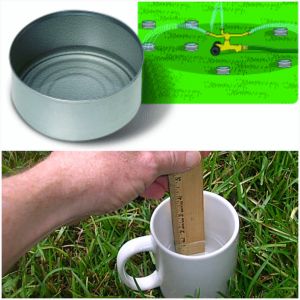
In summer, most people water their lawns, but often forget their trees! A good, lush green lawn may require more frequent watering than established trees and shrubs, but it is possible to properly water your lawn while at the same time not meeting a tree’s needs.
It is recommended that established trees and shrubs get 1″ of water over their root zone every 7-10 days. Natural rainfall may accomplish this on occasion, but our typical summer doesn’t provide adequate amounts of rain all the time.
Slow soaking is best, reducing wasteful runoff and evaporation loss. An accurate way of measuring how much water you have applied is to place a sprinkler in the areas you wish to water and then place a container(s) with straight sides—such as a coffee mug, metal can, or plastic container – within the coverage area of the sprinkler. Then, turn the water on until 1″ of water has accumulated in the container, using a ruler to measure the depth of the water.
Be sure to cover as much of the area beneath the branch spread of the tree as possible.







